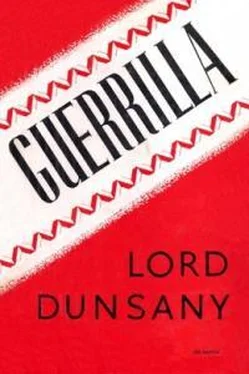Лорд Дансейни - Guerrilla
Здесь есть возможность читать онлайн «Лорд Дансейни - Guerrilla» весь текст электронной книги совершенно бесплатно (целиком полную версию без сокращений). В некоторых случаях можно слушать аудио, скачать через торрент в формате fb2 и присутствует краткое содержание. Год выпуска: 2015, Издательство: epubBooks Classics, Жанр: Прочие приключения, на английском языке. Описание произведения, (предисловие) а так же отзывы посетителей доступны на портале библиотеки ЛибКат.
- Название:Guerrilla
- Автор:
- Издательство:epubBooks Classics
- Жанр:
- Год:2015
- ISBN:нет данных
- Рейтинг книги:5 / 5. Голосов: 1
-
Избранное:Добавить в избранное
- Отзывы:
-
Ваша оценка:
- 100
- 1
- 2
- 3
- 4
- 5
Guerrilla: краткое содержание, описание и аннотация
Предлагаем к чтению аннотацию, описание, краткое содержание или предисловие (зависит от того, что написал сам автор книги «Guerrilla»). Если вы не нашли необходимую информацию о книге — напишите в комментариях, мы постараемся отыскать её.
Guerrilla — читать онлайн бесплатно полную книгу (весь текст) целиком
Ниже представлен текст книги, разбитый по страницам. Система сохранения места последней прочитанной страницы, позволяет с удобством читать онлайн бесплатно книгу «Guerrilla», без необходимости каждый раз заново искать на чём Вы остановились. Поставьте закладку, и сможете в любой момент перейти на страницу, на которой закончили чтение.
Интервал:
Закладка:
In war, he explained to him, certain things were necessary, and logically followed on other things. And he explained to Srebnitz the usage of reprisals, with the exactitude of a chess player explaining an opening. Srebnitz agreed at once. The position was clear enough to the major, but he was a little surprised to find that it was so clear to a man who had not the advantage of German culture. And so he explained it all over again, which logically was what he ought to have done if Srebnitz had not understood him, but not when he did understand. Well, there was no harm in making sure; and the clear logic of his argument had a soothing effect on the major's own mind, which was slightly teased now and again with doubts as to whether Srebnitz was as well disposed to him as he appeared, and as he certainly ought to be. If one loses one's queen at chess to an important piece on the other side, one does not bear resentment to that piece.
Srebnitz did not appear to act in any such foolish way, and logically ought not to do so; so why suppose that he did? And yet the fact remained that nobody could tell what anyone outside Germany would think about anything. And this fact, however absurd, should be borne in mind, for a reasonable man must never neglect a fact. In Germany the moment the Fuehrer spoke on the wireless on any subject, one knew what everyone thought on that subject: in an ordered country it must be so; then all men acted the same way, because they thought the same way, and their action came with the weight of a single blow, eighty million people striking together; and such a blow must be victorious. It was very simple; it was the difference between organization and running wild, the difference between culture and savagery, and incidentally the difference between victory and occupation. The occupied countries must be taught this now, like children in school; those as yet unoccupied must learn by defeat. "So," said the Prussian out loud. Srebnitz smiled. Was it a natural smile? All that the major and his forbears had learned for three generations said that it was, for how else should other peoples act towards Prussians? But some older, simpler lore, that had not studied psychology, seemed to be doubting that smile. One more word to Srebnitz.
But Srebnitz said, "I must cook your dinner now. It will not be cooked quite as well as it used to be."
"Naturally," said the Prussian.
Then Srebnitz went to the kitchen to do his best.
A foolish remark about the cooking. How could a man cook as well as a woman? Only an uncultured people, thought the major, would trouble to point out such a thing. Did the boy think he would punish him for the inferior cooking? Germans were not unreasonable.
Srebnitz brought in the dinner, and the meat was tough, as the officer had expected. He made no complaint. He knew well enough that a woman's place was the kitchen. Even a German man would not try to compete there, still less an uncultured man. The woman had cooked well. But such things could not be considered in war. Reprisals came first. Indeed it was by reprisals that Germany must keep her hold on the occupation of the world. Decent cooking would follow.
The major and Srebnitz ate together. Often Srebnitz's hand would move to his waist and linger there for a moment.
"Your stomach aches?" asked the Prussian.
"No, no, no," said Srebnitz. "Yes, it does." And suddenly Srebnitz realised that he must have been fondling the handle of the knife that was under his shirt.
It might have been an awkward twenty minutes while the Prussian major and Srebnitz ate their dinner, were it not for the young man's frequent smiles. One thing prevented the military shrewdness of the major from detecting any falsity in those smiles, and that was that they were entirely sincere: whenever Srebnitz smiled he was thinking of his rifle that he was going to get and take away to the Mountain. The Mountain and its bright freedom, and the free men whom he would meet there, filled his mind as flowers are filled with sunlight. After dinner the major marched out. And Srebnitz was left in the lonely house, to sit by the kitchen fire and make his plans. And the more he planned, the harder it seemed to be, till the daring act that should win the rifle seemed the easiest step of all. First of all, the Germans had imposed a curfew within half an hour of sunset, as one of the punishments for the death of their sentry. This would mean his arrest if found at night in the streets at all, even without carrying a German rifle, and there would be a bayonet with it too. There would be a long way to go through the streets from the place where the sentry would be. And then there was a moon about four days old: that would not help things either. Srebnitz's plans had not progressed very far when there came a knock at the door. It was not the terrible Gestapo; in fact it was evidently not a German at all. Srebnitz could not guess who it could be; and, had he guessed for long, the man he saw in the doorway would have been the last of his guesses. It was Gregor.
"Gregor!" Srebnitz exclaimed.
Gregor smiled.
"They have killed my father and mother," said Srebnitz.
"Yes, and mine," said Gregor. "Our fathers and mothers were lost when the Germans first came. We are probably all lost. But The Land will be free."
"I will get the rifle," said Srebnitz.
"That is right," said Gregor. "It will be beautiful up on the Mountain with a rifle. Their sentries wear bandoliers. Remember to bring the bandolier."
"There's a curfew."
"I came to tell you about that," said Gregor. "You must go by moonlight, so that the sentry can see you. You couldn't get close in the dark. Have a piece of white paper in your hand. Say ' Erlaubnis '—that means 'permit'—and give it to him."
"But when he reads it?" said Srebnitz.
"He must never read it," said Gregor.
"No," said Srebnitz. "And then?"
"Then take his rifle and bandolier, and take off your boots, and hide till the moon goes down. There will be nobody near at the time, because you will choose a time when the sentry is alone, before you take your permit to him. Tie your boots round your neck; you will want them on the Mountain."
"Where will I hide?" asked Srebnitz.
"The two best places are the wood and the public gardens," said Gregor, for a pinewood came right into the town. "So avoid those two. The Germans will search them as soon as they miss their sentry; there are plenty of little gardens among the houses; you know them all; and you can move on from one to another whenever the street is quiet."
Srebnitz did not speak, but gazed thoughtfully into the fire, for they had come to the kitchen.
"Well?" said Gregor.
"I was thinking of the rifle and bayonet," said Srebnitz.
"Don't bring the bayonet," said Gregor. "Hlaka doesn't want them. The Germans will be twenty, and even fifty, to one, when we fight, so we can't sail in with the bayonet."
"Fifty to one?" said Srebnitz.
"Perhaps a hundred to one," said Gregor. "But that doesn't trouble Hlaka. He makes up the difference by brains. But you must use your brains, or Hlaka will flog you."
Perhaps a troubled look came into Srebnitz's face, for he knew he was not as clever as Gregor, and he feared that he might fail the redoubtable Hlaka.
"You've shot coneys, haven't you?" said Gregor.
"A few," said Srebnitz. "But only with an air–gun."
"That's all the brains you need," said Gregor, "and more than enough. A stupid man might kill a coney with a rifle, if he took a long shot, but not with an air–gun. And we don't take long shots."
"From how far do you fire?" asked Srebnitz.
"What is the furthest that you have ever shot a coney?" asked Gregor.
"I shot one once at seventy–five metres," said Srebnitz. "I paced it."
"Then never fire at over seventy metres," said Gregor, "at a German. The first five cartridges, think of your mother; the next five think of your father; and don't waste one. We don't fight battles. If an officer gave an order to open fire at four hundred yards, Hlaka would execute him. No battles; only killing."
Читать дальшеИнтервал:
Закладка:
Похожие книги на «Guerrilla»
Представляем Вашему вниманию похожие книги на «Guerrilla» списком для выбора. Мы отобрали схожую по названию и смыслу литературу в надежде предоставить читателям больше вариантов отыскать новые, интересные, ещё непрочитанные произведения.
Обсуждение, отзывы о книге «Guerrilla» и просто собственные мнения читателей. Оставьте ваши комментарии, напишите, что Вы думаете о произведении, его смысле или главных героях. Укажите что конкретно понравилось, а что нет, и почему Вы так считаете.










